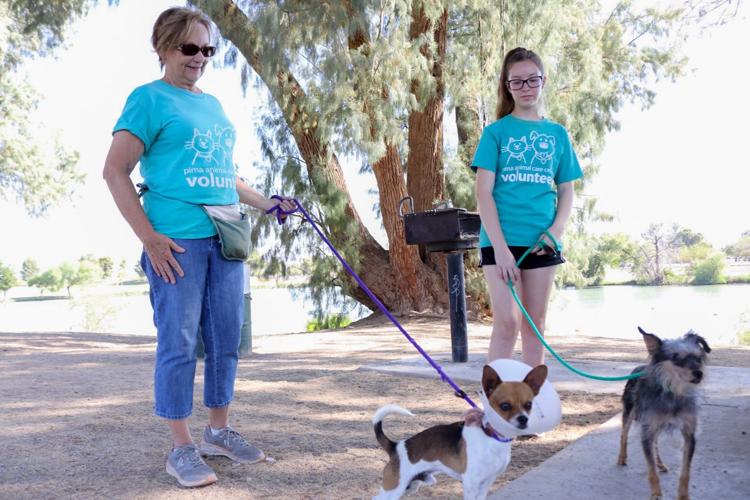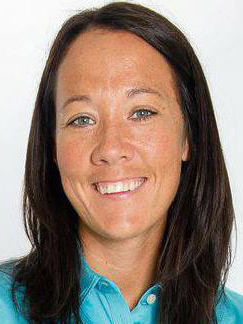Pima Animal Care Center has hired a new director who will bring her expertise to the shelter starting July 10. Kristen Auerbach, former deputy chief animal services officer at the Austin (Texas) Animal Center, was part of a team that led the nation as the largest no-kill shelter.
The Star spoke to Auerbach about her experience working with other animal shelters, why she decided to come to PACC and what she’s hoping to bring to her new position.
Q: How did your interest and care for animals begin?
A: I started working in animal welfare in a shelter in Ohio in the late 1990s. I began my career as a dispatcher and I worked there for about six months. And I got to work as a cruelty officer going out and rescuing animals from neglect situations. What I found was that every animal that I was rescuing and bringing back was being euthanized and these were treatable, healthy animals. But there were no resources to save them, it was a really different time in animal welfare and I ended up quitting. I didn’t want to spend my life saving animals only to have them be euthanized.
In 2012, I was working for the Fairfax County Park Authority in Fairfax, Virginia. My boss approached me and said she was going to work at the animal shelter in Fairfax County and she let me know she was going to have a couple positions open, one being her assistant director and I said I’d never want to do that work again; I don’t what to spend my career having to kill healthy animals.
She said if you come and accept a position there you would get to save them, you wouldn’t have to just euthanize them. And so that was sort of where the story began, I went to work for her as the assistant director, spent several years there and then went to Austin. Austin has the highest life-saving rate of any large city in the country and I wanted to learn how they were doing it.
Q: How have your previous jobs prepared you for your position with PACC?
A: I’m really proud of the accomplishments we had in Fairfax County. We brought the animal center to a 90 percent save rate. We overturned pitbull adoption restrictions; when I got to Fairfax County there were still strict adoption restrictions. So we got that overturned so that all animals were treated equally and we started a vast array of programs for students, for community groups and we built our volunteer and foster program.
I wanted to come to Austin because it’s a very large city, the intake is about 18,000 and yet there saving more than 95 percent of the animals that come into the shelter. That’s a pretty big number and I went there and we not only brought that save rate even higher to what it is today which is about 98 percent of 18,000 animals but we really built up the community partnerships that helped us do that.
In Austin there’s a variety of rescue groups and when we got there they were all working really hard but they weren’t necessarily working together. One of the things I did in my time in Austin was bring those community groups together, the rescue groups, the volunteers, the fosters, the other partners, bringing them together so that we’re all working to achieve the same goals.
Q: What accomplishments are you most proud?
A: I think what I’m most proud of is that we turned both of those communities into national models, working with my director and my colleagues, both of those communities became national models in life saving.
Q: What ideas are you excited to try or implement here at PACC?
A: I was really drawn to Tucson because, like Austin, the people who live here have shown how much they value animals and how much they understand the health of a community can really be shown in the health of the pets and the people in the community. So it was a place I wanted to come and the lifesaving rates they’re already achieving is really extraordinary. PACC nearly takes in 20,000 animals a year and they’re saving almost every one of them, they’re saving a really high number of animals so I was exited to come here for that reason.
I think what I bring is a strong background in building programs to tackle groups of animals still at risk, so whether they’re neonatal kittens who aren’t thriving in the shelter environment or adult dogs who are declining over time in the shelter environment, I have a proven track record of building programs to save those groups of animals and get them out through live outcomes out of the shelter.
Q: What is your favorite success story from your career?
A: We always challenged this idea of ‘what does adoptable mean’, you hear a lot about adoptable animals and we were always pushing the boundaries of what that means. One of the things that happened in Austin is we had a group of roosters come in, 27 roosters from a cockfighting ring. Those animals have long been considered unadoptable because they’re considered not friendly, not able to live with other roosters and so we really decided to challenge that assumption.
One of things people don’t really realize is that if roosters’ spurs are cut off they don’t have the sharp nails that allow them to harm other animals. In place of where that spur is the people that fight them attach a little blade and once that blade is taken off, roosters are essentially harmless. We knew that they couldn’t exactly hurt other birds in the way that people feared so we tried to adopt them out and we worked with a rescue group who had been placing fighting roosters. We decided to advertise them and we said ‘if one person comes in that’s one of the 26, at least we achieved an accomplishment.’ To our surprise within five hours of opening on the day they became available — all 27 of them were adopted.
We microchipped them all so we knew where they went and their adopters still send us pictures of them today, happily living in flocks, living outside as pets with families. So that was a really exciting moment for us to realize that there’s so many ways to challenge this idea of adoptable and the vast majority of animals in our community can find homes.







